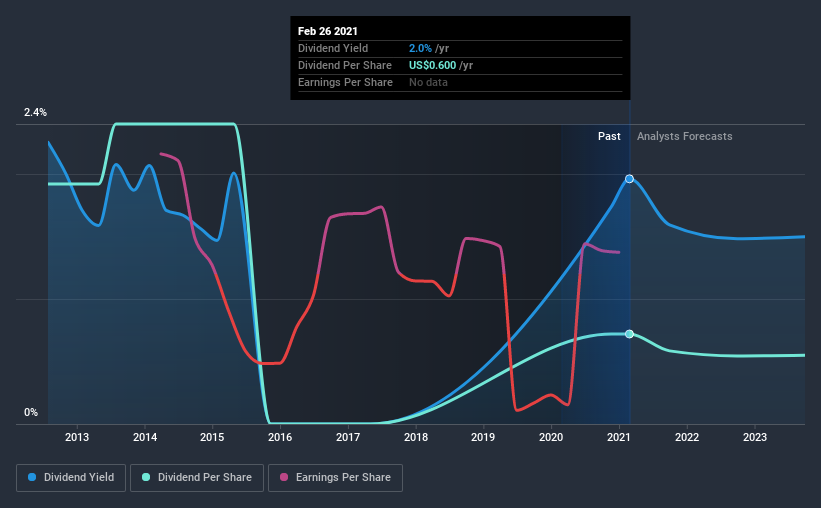Four Days Left Until Edgewell Personal Care Company (NYSE:EPC) Trades Ex-Dividend
Readers hoping to buy Edgewell Personal Care Company (NYSE:EPC) for its dividend will need to make their move shortly, as the stock is about to trade ex-dividend. Ex-dividend means that investors that purchase the stock on or after the 4th of March will not receive this dividend, which will be paid on the 6th of April.
Edgewell Personal Care's upcoming dividend is US$0.15 a share, following on from the last 12 months, when the company distributed a total of US$0.60 per share to shareholders. Calculating the last year's worth of payments shows that Edgewell Personal Care has a trailing yield of 2.0% on the current share price of $30.59. Dividends are an important source of income to many shareholders, but the health of the business is crucial to maintaining those dividends. So we need to investigate whether Edgewell Personal Care can afford its dividend, and if the dividend could grow.
See our latest analysis for Edgewell Personal Care
Dividends are typically paid from company earnings. If a company pays more in dividends than it earned in profit, then the dividend could be unsustainable. Edgewell Personal Care is paying out just 13% of its profit after tax, which is comfortably low and leaves plenty of breathing room in the case of adverse events.
Click here to see the company's payout ratio, plus analyst estimates of its future dividends.
Have Earnings And Dividends Been Growing?
Businesses with shrinking earnings are tricky from a dividend perspective. If earnings fall far enough, the company could be forced to cut its dividend. With that in mind, we're discomforted by Edgewell Personal Care's 17% per annum decline in earnings in the past five years. Ultimately, when earnings per share decline, the size of the pie from which dividends can be paid, shrinks.
The main way most investors will assess a company's dividend prospects is by checking the historical rate of dividend growth. Edgewell Personal Care has seen its dividend decline 10% per annum on average over the past nine years, which is not great to see. While it's not great that earnings and dividends per share have fallen in recent years, we're encouraged by the fact that management has trimmed the dividend rather than risk over-committing the company in a risky attempt to maintain yields to shareholders.
The Bottom Line
From a dividend perspective, should investors buy or avoid Edgewell Personal Care? Edgewell Personal Care's earnings per share are down over the past five years, although it has the cushion of a low payout ratio, which would suggest a cut to the dividend is relatively unlikely. We think this is a pretty attractive combination, and would be interested in investigating Edgewell Personal Care more closely.
On that note, you'll want to research what risks Edgewell Personal Care is facing. For instance, we've identified 3 warning signs for Edgewell Personal Care (1 is concerning) you should be aware of.
We wouldn't recommend just buying the first dividend stock you see, though. Here's a list of interesting dividend stocks with a greater than 2% yield and an upcoming dividend.
This article by Simply Wall St is general in nature. It does not constitute a recommendation to buy or sell any stock, and does not take account of your objectives, or your financial situation. We aim to bring you long-term focused analysis driven by fundamental data. Note that our analysis may not factor in the latest price-sensitive company announcements or qualitative material. Simply Wall St has no position in any stocks mentioned.
Have feedback on this article? Concerned about the content? Get in touch with us directly. Alternatively, email editorial-team (at) simplywallst.com.

 Yahoo Finance
Yahoo Finance 
